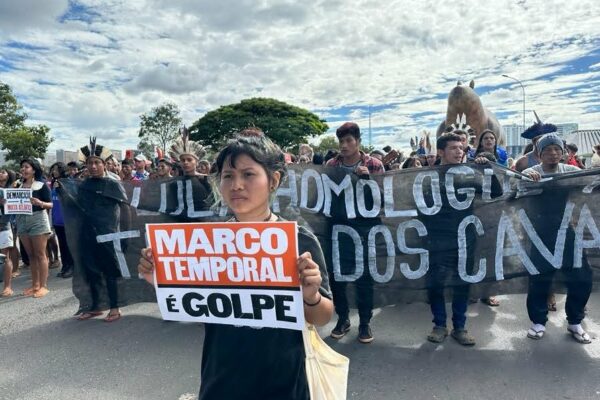June was an eventful month in Peru with good and bad news for indigenous rights in the Amazon. On June 5th Peru elected a new president, Ollanta Humala, cautiously seen as a positive step for indigenous rights. Then, on June 15th, the Peruvian Congress approved the controversial new Forestry Law to the outcry of indigenous groups who claim there was no adequate consultation process. The next day on June 16th the criminal court in Lima dropped the politically motivated charges against AIDESEP President Alberto Pizango and other national indigenous leaders for their involvement in the protests in Bagua two years ago. Meanwhile, the Peruvian Congress approved a new report on the events around Bagua concluding that no government ministers were responsible and that blame lies squarely on the police chiefs who carried out the operation.
The Forestry Law was approved with 61 votes in favor, 23 against and one abstention. The new Forestry Law has been presented as essential to Peru’s compliance with the environmental annex of the US-Peru Free Trade Agreement (FTA), but an earlier version of the law provoked massive protests across the Amazon when it was passed in 2008 without consultation along with several other laws that undermined indigenous rights and threatened indigenous territory. Peru’s Congress approved a law for consultation with indigenous peoples on May 19th 2010, but it was vetoed by President Alan Garcia. However, the Peruvian Congress pushed ahead with a new version of the Forestry Law without the consultation law in a process which AIDESEP, the national organization representing the largest number of indigenous peoples of the Peruvian Amazon, has denounced as not meeting minimum standards for consultation of ILO Convention 169 and the United Nations Declaration on the Rights of Indigenous Peoples (UNDRIP). AIDESEP is concerned that the new Foresty Law opens up forest outside indigenous land titles to logging companies. Hundreds of communities do not yet have formal land title in the Amazon and a large proportion of indigenous territory is not recognized within land titles. As a result, thousands of acres of indigenous land could be auctioned off to logging companies under the new Forestry Law.
On June 16th the case against AIDESEP indigenous leaders Alberto Pizango Chota, Marcial Mudarra Taki, Saul Puerta Peña, Servando Puerta Peña and Teresita Irene Antazu was dropped after the court failed to prove the crimes of endorsing and inciting criminal acts. The complaint, filed by the Public Minister of Peru two years ago, accused the indigenous leaders being supportive and apologetic to the crimes allegedly committed by indigenous peoples in the violent clashes in Bagua on June 5th 2009. The trial court found that “the facts do not constitute apology for the crimes of sedition and mutiny and the messages from both the press and the press conference do not contain an incitement that would cause the Amazonian population to carry out the reported crimes, and that it only channeled the will of the population, which was seeking the repeal of the decrees in question.”
On June 9th 2011, the Peruvian Congress approved a new report on the violent events in Bagua. The report freed ex-government ministers Mercedes Cabanillas, Yehude Simons y Mercedes Araoz of criminal responsibility or any sanction. At the time they all worked in the government cabinet and were allegedly involved in the case. The report put the blame squarely on the leaders of the police who carried out the operation.
The conclusion of the criminal case against AIDESEP leaders is an important step towards ending the politically motivated persecution of indigenous leaders following protests across the Amazon in 2009. However, there are still several pending lawsuits against indigenous leaders which impede their ability to defend indigenous rights. The incoming Humala government has an opportunity to end the politically motivated persecution of indigenous leaders as a first step towards solving the numerous social conflicts in Peru. However, over two years from the violent confrontations in Bagua in 2009 there is still no consensus on who called for the police operation which left 34 indigenous peoples and police dead and why it went so badly wrong. Similarly, the government has still failed to comply with its obligations under the ILO Convention 169 to implement a consultation law. The failure to consult new laws and policies with indigenous peoples was at the heart of the protests in 2009 and many of the social conflicts across the country.













